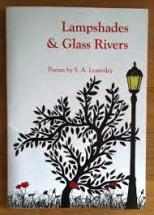Emma Lee reviews a prize-winning pamphlet by S A Leavesley
 Lampshades and Glass Rivers
S A Leavesley
Lamplight Press, www.lamplightpress.co.uk
ISBN 9781907382987
24pp £6.50
Lampshades and Glass Rivers
S A Leavesley
Lamplight Press, www.lamplightpress.co.uk
ISBN 9781907382987
24pp £6.50
This sequence of twenty short poems follows Ada’s love, marriage and attempts to start a family against the background of her grandmother’s fleeing from Poland. The poems focus on Ada’s internal state and journey. In VIII, Ada stays in a nameless hotel, country unknown,
Each room the size
of her mind, each light
dressed in its own lampshade.
The glass hypnosis
of the beads hung before her
pauses her steps.
Each guest's wake
trembles in a sealess wave
across its rounded surface,
then gone.
There’s a focus on things hidden: the rooms behind closed doors that Ada has to imagine, each lightbulb hidden by a lampshade, the other guests, who might as well be ghosts, that Ada is aware of but doesn’t interact with. Yet Ada makes no attempt at discovery, she doesn’t explore the room but accepts it at face value. The reference to hypnosis and use of trembles when the glass beads of the lampshade react to guests’ comings and goings, suggests Ada is not in control of her fate and the hidden things may be guiding her. She reaches out to Babcia, her grandmother, whom she remembers knitting. In XI,
But to nurse a man in war is not
to tend your own baby in peace,
empty darkness curved to your hand.
What wouldn't she give now
for the spell of Babcia's needles
or an angel's alchemic touch?
Sadly there is a miscarriage and Ada is left baby-less. Ada’s narrative doesn’t include her husband so readers don’t learn of his reaction but are left to speculate. She appears to have been left to deal with it alone although it’s not known whether her husband has chosen to be absent or if Ada has blocked him from her narrative. Ada struggles to find words to describe what she’s been though, in XVI
Legs parted wide, the bare cave
of her creation an open exhibition hall
to the gowned visitors' gaze.
The art on my womb walls
is rawer than any you'll ever see –
she wants to explain all
with pure, objective clarity.
But her words are splattered pain
daubed with indignity.
The subtle rhyme scheme shows how interlinked each element in the poem is, even though Ada feels her failure to communicate articulately with the hospital staff.
This pamphlet was the winner in the Overton Poetry Prize 2015 run by Loughborough University with proceeds from the competition funding a poet in residence at the university. It’s also a sparkling example of how pared-down language, carefully controlled rhythm and crafting combined with rich imagery can make poems dazzle.
.
Emma Lee‘s most recent collection is Ghosts in the Desert (Indigo Dreams, 2015). She was co-editor for Over Land Over Sea: poems for those seeking refuge (Five Leaves, 2015) and blogs at http://emmalee1.wordpress.com
Emma Lee reviews a prize-winning pamphlet by S A Leavesley
This sequence of twenty short poems follows Ada’s love, marriage and attempts to start a family against the background of her grandmother’s fleeing from Poland. The poems focus on Ada’s internal state and journey. In VIII, Ada stays in a nameless hotel, country unknown,
There’s a focus on things hidden: the rooms behind closed doors that Ada has to imagine, each lightbulb hidden by a lampshade, the other guests, who might as well be ghosts, that Ada is aware of but doesn’t interact with. Yet Ada makes no attempt at discovery, she doesn’t explore the room but accepts it at face value. The reference to hypnosis and use of trembles when the glass beads of the lampshade react to guests’ comings and goings, suggests Ada is not in control of her fate and the hidden things may be guiding her. She reaches out to Babcia, her grandmother, whom she remembers knitting. In XI,
Sadly there is a miscarriage and Ada is left baby-less. Ada’s narrative doesn’t include her husband so readers don’t learn of his reaction but are left to speculate. She appears to have been left to deal with it alone although it’s not known whether her husband has chosen to be absent or if Ada has blocked him from her narrative. Ada struggles to find words to describe what she’s been though, in XVI
The subtle rhyme scheme shows how interlinked each element in the poem is, even though Ada feels her failure to communicate articulately with the hospital staff.
This pamphlet was the winner in the Overton Poetry Prize 2015 run by Loughborough University with proceeds from the competition funding a poet in residence at the university. It’s also a sparkling example of how pared-down language, carefully controlled rhythm and crafting combined with rich imagery can make poems dazzle.
.
Emma Lee‘s most recent collection is Ghosts in the Desert (Indigo Dreams, 2015). She was co-editor for Over Land Over Sea: poems for those seeking refuge (Five Leaves, 2015) and blogs at http://emmalee1.wordpress.com
By Michael Bartholomew-Biggs • books, poetry reviews, year 2016 1 • Tags: books, Emma Lee, poetry